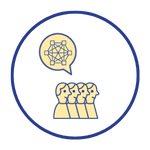Collective Learning
Collective Learning is vital if we are going to find effective ways to create radical change
Mission-led radical change pushes us to work in new and sometimes uncomfortable ways. An adaptive approach to the process of change is vital. We must expect that we will make mistakes. What is critical is that we learn.
A community culture of collective learning needs to be established to support the change process. This should allow experiments to happen, mistakes to be made, failures to be accepted and examined, lessons to be learned and improvements made quickly.
Collective learning is not based on ‘teaching’ but on ‘learning by doing’ and creating reflective, collaborative and honest spaces for gathering and synthesising lessons learned and implications for future work
To make space for this reflective on-the-job learning, Mission Incubator teams need to organise regular community ‘learning lab’ sessions that should include a mix of relevant stakeholders who are interacting with current actions and experiments.
It is also important to ask ‘why didn’t we already manage to do what we know we should do?’ and dig into local examples of past work that can help to show up hard answers to this question. This is needed to identify the real barriers to change in communities and to start experimenting and learning how to overcome them.
Overall outcome impact indicators are also important for evaluation and learning. Communities should develop an appropriate outcomes evaluation frame that is holistic as well as tailored to their missions. One option is to start from the Thriving Communities frame of the breadth and depth of what it means to live and thrive within planetary boundaries, or another linked tool that communities find most suitable. Also critical to helping us learn are indicators for how change is advancing and progress that is being made on enablers of change – eg. assessing change in the ‘maturity’ of things such as the pace of innovation, institutional models, policy, finance models etc. To help with this process, Thriving Communities works with a maturity matrix assessment based on our Enablers of Change frame.
There is no fixed formula for how to learn that will suit every community. The critical thing is that there is a commitment to honest and sustained collective learning, that roles and resources are dedicated to designing and facilitating learning processes, and that lessons-learned are shared widely and effectively.
Thriving Communities provides important space for communities to learn and exchange with each other through the transnational Thriving Communities learning labs and sessions that are organised on a regular basis.
On the Thriving Communities Learning Space you can find insights and cases captured from our learning processes, as well as links to upcoming learning events.

